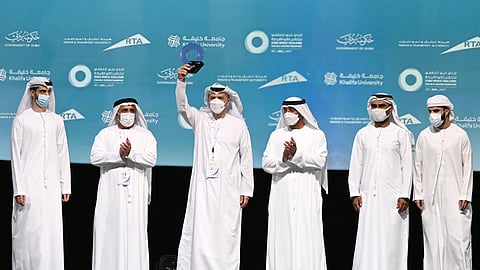Ahmed bin Saeed Honours Winners of Self-Driving Transport Challenge
Under the patronage of His Highness Sheikh Hamdan bin Mohammed bin Rashid Al Maktoum, Crown Prince of Dubai and Chairman of the Executive Council of Dubai, His Highness Sheikh Ahmed bin Saeed Al Maktoum, President of the Dubai Civil Aviation Authority and Chairman and CEO of Emirates Airline and Group, honoured the winners of the 2nd Dubai World Challenge for Self-Driving Transport.
The competition, held by Dubai’s Roads and Transport Authority (RTA) under the theme ‘Self-Driving Logistics’, offered prizes over AED6 million.
His Highness honoured the winners during a ceremony held at the Dubai World Trade Centre, in the presence of His Excellency Mattar Mohammed Al Tayer, Director-General, Chairman of the Board of Executive Directors of the Roads and Transport Authority.
During the ceremony, His Highness also announced the launch of the 3rd Dubai World Challenge for Self-Driving Transport under the theme ‘Self-Driving Buses’.
His Highness Sheikh Ahmed bin Saeed Al Maktoum and the attendees watched a movie about the Dubai World Congress for Self-Driving Transport, which was held as part of RTA’s efforts to support the Dubai Strategy for Smart Self-Driving Transport, launched by His Highness Sheikh Mohammed bin Rashid Al Maktoum, Vice President and Prime Minister of the UAE and Ruler of Dubai.
The strategy calls for transforming 25% of total mobility journeys in Dubai into smart and driverless journeys by 2030.
The one-day congress was attended by international experts and specialists, policymakers, technology developers, researchers and academia as well as the global leaders of innovation and technologies of connected and autonomous vehicles.
Future Aspirations
During a keynote speech delivered at the ceremony, Sebastian Thrun, Professor at Stanford, founder of Google X, CEO of Kitty Hawk for flying vehicles and the Godfather of Self-Driving Cars and Google Waymo, said: “When it comes to mobility innovation, Dubai is the most forward-looking city in the world.
"The Dubai World Challenge for Self-Driving Transport has made a substantial contribution to leveraging the self-driving transport technologies, and attracting global firms to Dubai.
Self-Driving Vehicle to Distribute PPEs in Sharjah
“What distinguishes the Dubai World Challenge for Self-Driving Transport is that it is comprehensive and unique worldwide. RTA has an ambitious vision and strategy in the field of self-driving transport, which encompasses all means of transportation and drones.”
Dubai Challenge
The 2nd Dubai World Challenge for Self-Driving Transport saw the participation of 31 academic institutions and international companies.
13 candidates qualified for the final stage of the Challenge, including six companies in the category of Leading Companies, namely: Neolix from China, Arti from Austria, iAuto from Taiwan, Yandex from Russia, Kiwi Bot from the United States of America, and Life Touch from Italy.
In the Local Universities and Research Centres (Academia) category, seven candidates qualified for the finals, namely: New York University Abu Dhabi, Khalifa University of Science and Technology, Rochester Institute of Technology Dubai, American University of Sharjah, University of Sharjah, and the University of Dubai.
The challenge is devoted to Self-driving Logistical Services, including ground transport and drones. Over six weeks, the qualified projects and initiatives were subjected to various tests at a testing site in the Dubai Silicon Oasis.
Participants were evaluated based on three key elements: the first: safety, which included reliability, visibility handling, interaction with pedestrians, and speed control.
The second element was usability, which included speed, ease of use, cargo safety and understandable behaviour.
The third element was: the level of maturity and included passing the scenario and operator interaction, path planning, detection and prediction.
Winners
The honoured winners included Neolix (China) in partnership with Gaussin (France), and Yandex (Russia), who all shared the first position in the Leading Companies Award (Pioneers). Each winning company got $700,000.
Neolix Project focused on a vehicle equipped with a platform that can be configured for different use scenarios, with the highest payload capacity among all participants to enable simultaneous delivery of several goods.
The system is characterised by its adaptability to different scopes of operational design, road and pedestrian zone scenarios, and a well-designed driving programme focused on the safety of pedestrians, road users and packages during the various stages of transportation.
Yandex Ground Vehicle project offers a comprehensive solution in terms of mechanical design, automated driving programmes, and an integrated application.
It is also characterised by a strong performance in coping with dynamic, static and environmental obstacles, vehicle speed, and its ability to deliver the largest number of packages among the vehicles taking part in the challenge.
Local Academia
Winners in the category of local universities and research centres included Khalifa University, who won the Ground Robots and got $100,000 for designing a robot featuring a unique mechanical design tailored to rugged conditions and terrain.
It has a driving programme focused on risk management strategies, touchless package delivery, and the successful clearing of tests and obstacles.
The American University of Sharjah came second and won $50,000 for a robot equipped with a set of advanced sensors and a built-in approach for detecting obstacles.
The robotic equipment and peripheral devices have been entirely designed and built by the team. The robot succeeded fairly in the plotting of the route and the avoidance of obstacles.
In the field of drones, New York University Abu Dhabi was the winner and received a prize of $100,000 for a project that combines multiple helicopters in one plane.
It can lift large or asymmetric payloads and packages up to three kilograms with stable performance with an advanced testing infrastructure. It has a command centre that enables a fast and safe development process, and well-planned routes to improve safety.
Khalifa University finished second and won $50,000 for a modified drone fitted with a dedicated cargo compartment. It is characterised by rapid development and high reliability, and the ability to quickly deliver supplies in urban areas.
Read More: RTA and Cruise to Operate Self-Driving Taxi Services in Dubai


